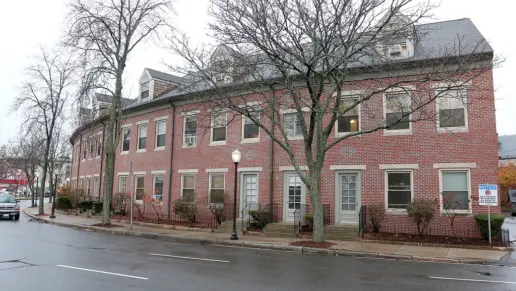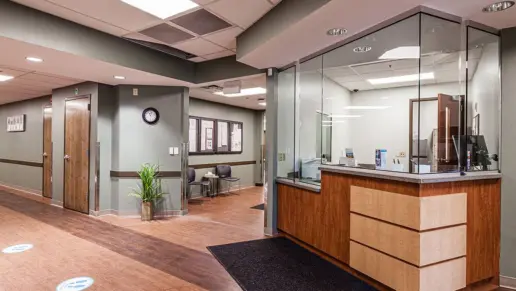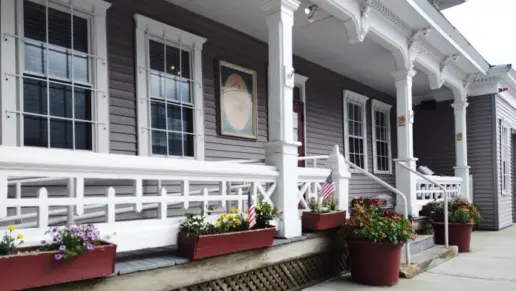The director of the facility is very discriminatory with the patients, she denies when some client that doesn't fill her requirements come to the campus to ask for help, It's sad that the people that want to make positive changes in their lives cant get help just to have dif ...
About Jamaica Plain VA Medical Center
Jamaica Plain VA Medical Center is an integrated care clinic in Boston, Massachusetts. They offer primary care and various specialty services. This includes mental healthcare and addiction or substance use care. This facility delivers dedicated services to veterans and their families. They handle unique challenges and ongoing needs.
Their substance use care helps you address unhealthy alcohol use and life threatening addiction. They provide inpatient and outpatient treatment for substance use disorders. It all depends on your unique condition. Inpatient care takes place in their residential facility and is ideal if you’re dealing with severe addiction. It is highly structured and involves intensive therapy with 24/7 monitoring by trained physicians.
Outpatient addiction care is more flexible. It lets you receive treatment while maintaining your everyday routine. That said, both programs are rooted in evidence based practices like cognitive behavioral therapy delivered via individual and group sessions. Emphasis is on relapse prevention, solid coping strategies and life skills development. This is essential for achieving and maintaining lasting recovery.
You may also receive medication assisted treatment if it is included in your personalized care plan. This will especially be the case if you’re struggling with opioid addiction or alcoholism. The technique uses FDA approved medicine alongside counseling to support recovery.
This facility is also equipped to handle co-occurring disorders. This is when someone is simultaneously dealing with both mental health and substance use disorders. Their mental healthcare tackles common conditions like anxiety, depression and PTSD in an outpatient setting. Services include consultation, evaluation and individual and group counseling.
This facility supports same day appointments and walk in express care for emergency health issues. Secured telehealth support is available for most of their specialty care including mental health. Accessing care from the comfort of your home enhances flexibility. I especially like that you can qualify for care even if you’re not enrolled in VA health care.
It’s also financially convenient that they accept Medicare, Medicaid and TRICARE. If you’re uninsured and struggling financially you can leverage the VA financial hardship assistance. You may even get help with transportation to and from your appointment if eligible.
Aftercare services may involve connection to community resources like housing, employment support and financial aid via their social work. They may also provide referrals to peer support groups like AA or NA for ongoing support. Comments from past clients reflect positive experiences and impressive service delivery.
Latest Reviews
Rehab Score
Gallery
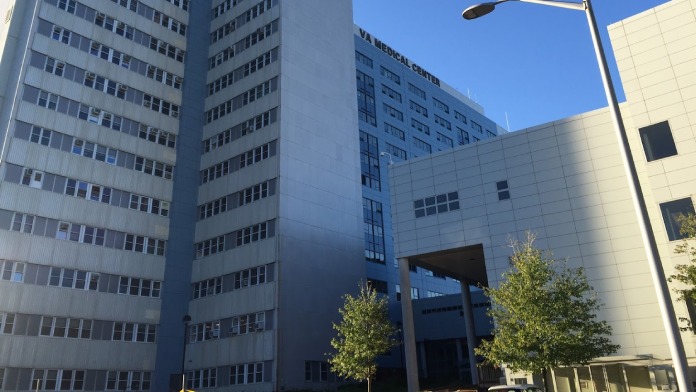
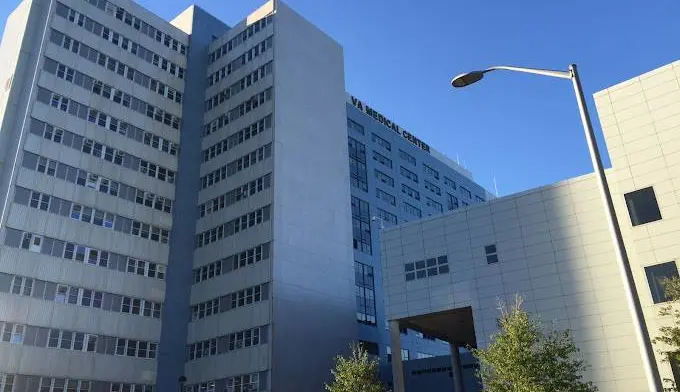
Location
Other Forms of Payment
Private insurance refers to any kind of healthcare coverage that isn't from the state or federal government. This includes individual and family plans offered by an employer or purchased from the Insurance Marketplace. Every plan will have different requirements and out of pocket costs so be sure to get the full details before you start treatment.
Self-pay involves paying for treatment out of your own pocket. You can use savings or credit, get a personal loan, or receive help from family and friends to fund your treatment. If you don't have insurance or your insurance plan doesn't cover a specific program, self-pay can help ensure you still get the care you need.
Military members, veterans, and eligible dependents have access to specific insurance programs that help them get the care they need. TRICARE and VA insurance can help you access low cost or no cost addiction and mental health treatment. Programs that accept military insurance often have targeted treatment focused on the unique challenges military members, veterans, and their families face.
Addiction Treatments
Levels of Care
Treatments
The goal of treatment for alcoholism is abstinence. Those with poor social support, poor motivation, or psychiatric disorders tend to relapse within a few years of treatment. For these people, success is measured by longer periods of abstinence, reduced use of alcohol, better health, and improved social functioning. Recovery and Maintenance are usually based on 12 step programs and AA meetings.
Addiction is a highly complex problem, and drug rehab in Massachusetts is often necessary to address it. These programs treat physical, mental, and relational issues that are involved. Treatment empowers individuals to manage these issues without the use of drugs.
A combined mental health and substance abuse rehab has the staff and resources available to handle individuals with both mental health and substance abuse issues. It can be challenging to determine where a specific symptom stems from (a mental health issue or an issue related to substance abuse), so mental health and substance abuse professionals are helpful in detangling symptoms and keeping treatment on track.
Opioid rehabs specialize in supporting those recovering from opioid addiction. They treat those suffering from addiction to illegal opioids like heroin, as well as prescription drugs like oxycodone. These centers typically combine both physical as well as mental and emotional support to help stop addiction. Physical support often includes medical detox and subsequent medical support (including medication), and mental support includes in-depth therapy to address the underlying causes of addiction.
Programs




Clinical Services
During cognitive behavioral therapy in Massachusetts, clients work with a trained counselor to identify negative thinking patterns and change them. This change in thinking has been shown to lead to changes in behavior to treat substance use and mental health disorders effectively.
Group therapy is any therapeutic work that happens in a group (not one-on-one). There are a number of different group therapy modalities, including support groups, experiential therapy, psycho-education, and more. Group therapy involves treatment as well as processing interaction between group members.
In individual therapy, a patient meets one-on-one with a trained psychologist or counselor. Therapy is a pivotal part of effective substance abuse treatment, as it often covers root causes of addiction, including challenges faced by the patient in their social, family, and work/school life.
Trauma therapy addresses traumatic incidents from a client's past that are likely affecting their present-day experience. Trauma is often one of the primary triggers and potential causes of addiction, and can stem from child sexual abuse, domestic violence, having a parent with a mental illness, losing one or both parents at a young age, teenage or adult sexual assault, or any number of other factors. The purpose of trauma therapy is to allow a patient to process trauma and move through and past it, with the help of trained and compassionate mental health professionals.
Whether a marriage or other committed relationship, an intimate partnership is one of the most important aspects of a person's life. Drug and alcohol addiction affects both members of a couple in deep and meaningful ways, as does rehab and recovery. Couples therapy and other couples-focused treatment programs are significant parts of exploring triggers of addiction, as well as learning how to build healthy patterns to support ongoing sobriety.
Research clearly demonstrates that recovery is far more successful and sustainable when loved ones like family members participate in rehab and substance abuse treatment. Genetic factors may be at play when it comes to drug and alcohol addiction, as well as mental health issues. Family dynamics often play a critical role in addiction triggers, and if properly educated, family members can be a strong source of support when it comes to rehabilitation.
Recreational therapy (aka therapeutic recreation) uses creative and fun activities to help with addiction recovery. Recreational therapists lead patients in entertaining and engaging activities like sports or games; art (drawing, painting, sculpture); drama, music, and dance; and/or community outings (field trips) to improve patients' physical, social, and emotional well-being.
The best time for nicotine replacement therapy (NRT) in Massachusetts is the moment you quit. You can start this therapy right away to lessen cravings and withdrawal symptoms, so the process is easier. Research has shown that NRT increases the chances of success. Options include patches, gum, inhalers, sprays, and lozenges.
Amenities
-
Residential Setting
-
Private Setting
Accreditations

The Commission on Accreditation of Rehabilitation Facilities (CARF) is a non-profit organization that specifically accredits rehab organizations. Founded in 1966, CARF's, mission is to help service providers like rehab facilities maintain high standards of care.
CARF Accreditation: Yes
Accreditation Number: 240401

The Joint Commission, formerly known as JCAHO, is a nonprofit organization that accredits rehab organizations and programs. Founded in 1951, the Joint Commision's mission is to improve the quality of patient care and demonstrating the quality of patient care.
Joint Commission Accreditation: Yes
Accreditation Number: 302978
Contact Information
150 South Huntington Avenue
Boston MA, 02130
